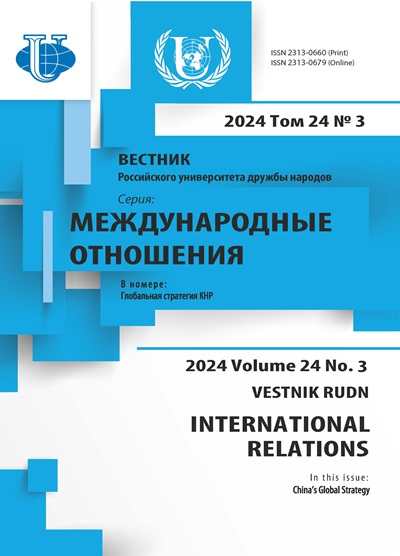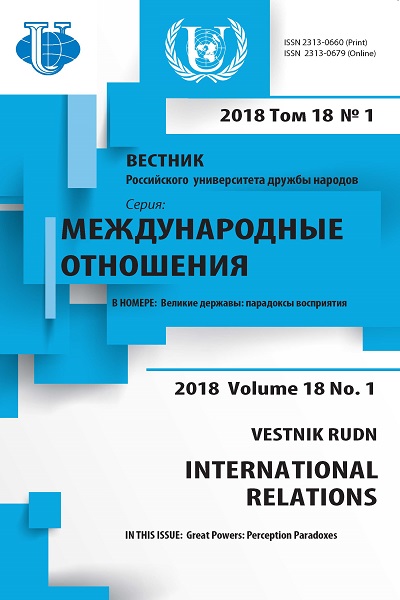Comparative analysis of the Russian foreign policy priorities and research interests of the national academic community
- Authors: Istomin I.A.1
-
Affiliations:
- Moscow State Institute of International Relations (MGIMO-University)
- Issue: Vol 18, No 1 (2018): Great Powers: Perception Paradoxes
- Pages: 162-185
- Section: APPLIED ANALYSYS
- URL: https://journals.rudn.ru/international-relations/article/view/18384
- DOI: https://doi.org/10.22363/2313-0660-2018-18-1-162-185
Cite item
Full Text
Abstract
Assessment of the correlation in priorities of the academic community and national foreign policy represents not only an intriguing research question by itself, but also an important practical task. As the governmental bodies remain the main source of demand for professionals and research in International Relations, such analysis could create a foundation for the status and material aspirations of scholars. Nevertheless, there were no systematic attempts to assess the abovementioned correlation on the basis of the sufficient empirical data. The current article is aimed to stimulate discussion regarding the connections between policy and academic priorities through providing comparative analysis of the major directions in Russian official documents and topics covered in PhD theses on International Politics. The analysis covers the period from the early 1990s until 2016. The use of PhD theses as an object for the current study is justified by their reflection of long-term research orientations, significant multiplying effect on higher education and academic publications, as well as define transition of young specialists from students to members of the professional community. The article proves that thematical preferences of the PhD theses, prepared in 2000s and 2010s, to a great extent correlate with the priorities defined by the Russian Concepts of foreign policy. However, they underrepresent several important policy directions, siuch as arms control, political aspects of global innovation system and international relations in the Post-Soviet space and in the Asia Pacific.
About the authors
Igor’ Aleksandrovich Istomin
Moscow State Institute of International Relations (MGIMO-University)
Author for correspondence.
Email: iaistomin@gmail.com
PhD in Political Sciences, Associate Professor of the Department of Applied Analysis of International Problems of the Moscow State Institute of International Relations (University) of the Ministry of Foreign Affairs of the Russian Federation
References
- Adamishin, A.L. (2016). In various years. Foreign policy essays. Moscow: Ves’ mir Publ. (In Russ.).
- Baturin, Yu.M., Iljin, A.L., Kadatskij, V.F., Kostikov, V.V., Livshits, A.Ya., Nikiforov, K.V., Pikoya, L.G. & Satarov, G.A. (2001). Yeltsin’s Epoch: essays in political history. Moscow: Vagrius. (In Russ.).
- Bogaturov, A.D. (2000). Ten years of the paradigm of absorption. Pro et Contra, 1, 195—201. (In Russ.).
- Bogaturov, A.D. (2004). The notion of world politics in theoretical discourse. Mezhdunarodnye protsessy, 2 (4), 16—33. (In Russ.).
- Bogaturov, A.D. (2007). Three generations of the Russian foreign policy doctrines. Mezhdunarodnye protsessy, 5(1(13)), 54—69. (In Russ.).
- Brooks, S.G. & Wohlforth, W.C. (2008). World out of balance: international relations and the challenge of American primacy. Princeton: Princeton University Press.
- Degteryev, D.A. (2015). Quantitative methods in international studies. Mezhdunarodnye protsessy, 13 (41), 35—54. (In Russ.).
- Istomin, I.A. & Baykov, A.A. (2015). Comparative specific of Russian and foreign academic journals. Mezhdunarodnye protsessy, 13(41), 114—140. (In Russ.).
- Katz, M.N. (2010). Russia’s Greater Middle East Policy: Securing Economic Interests, Courting Islam. IFRI. URL: https://www.ifri.org/sites/default/files/atoms/files/ifrirussiamiddleeastkatzeng april2010.pdf (assessed: 10.08.2017).
- Kozyrev, A.V. The Strategy of partnership. Mezhdunarodnaya zhizn’, 5, 5—15. (In Russ.).
- Kuhn, T.S. (1962). The Structure of Scientific Revolutions. Chicago: University of Chicago Press.
- Lakatos, I. (2008). Selected works in philosophy and methodology of science. Moscow: Akademicheskij proyekt Publ. (In Russ.).
- Latour, B. (1987). Science in action: how to follow scientists and engineers through society. Cambridge, Massachusetts: Harvard University Press.
- Layne, C. (2012). This time it’s real: The end of unipolarity and the Pax Americana. International Studies Quarterly, 56(1), 203—213. DOI: https://doi.org/10.1111/j.1468-2478.2011.00704.x.
- Lebedeva, M.M. (2015). Russian international studies: the possible contribution to the global academia. Vestnik Sankt-Peterburgskogo universiteta. Seria 6. Politologiya. Mezhdunarodnye otnosheniya, 2, 83—95. (In Russ.).
- Nye, J.S. (2004). Soft power: the means to success in world politics. N.Y.: Public Affairs.
- Nye, J.S. (2015). Is the American century over? Malden: Polity Press.
- Primakov, E.M. (1996). International relations on the edge of the 21st century. Mezhdunarodnaya zhizn’, 10, 3—13. (In Russ.).
- Shakleina, T.A. (Eds.). (2002). Foreign policy and security of the current Russia 1991—2002. Anthology. Volume 4. Documents. Moscow: MGIMO Publ. (In Russ.).
- Suchkov, M. (2016). Russia’s Plan for the Middle East. The National Interest. URL: http://nationalinterest.org/feature/russias-plan-the-middle-east-14908 (assessed: 10.08.2017).
- Tsygankov, P.A. (2013). “International Relations and World Politics” — consolidation of the educational and research discipline? Mezhdunarodnye protsessy, 11(34), 6—20. (In Russ.).
- Walt, S.M. (2005). The relationship between theory and policy in international relations. Annual Review of Political Science, 8, 23—48.
- Yakovlev, P.P. (2016). Russian strategic partnership with the Latin American countries: trends and countertrends. Perspektivy. Elektronnyj zhurnal, 1, 40—51. (In Russ.).
- Zakaria, F. (2009). The Post-American World. N.Y.: W.W. Norton.











